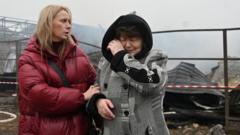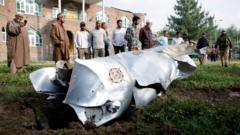The ongoing war in Ukraine presents a grim scenario for both soldiers and civilians. While some harbor aspirations for negotiations, many express a determination to keep fighting. This article delves into the thoughts of those on the ground, revealing their resilience amid exhaustion and loss, and highlighting contrasting opinions on how to address the prolonged conflict.**
Resilience and Dilemmas: Ukraine's Frontline Perspectives Amid Ongoing Conflict**

Resilience and Dilemmas: Ukraine's Frontline Perspectives Amid Ongoing Conflict**
Exploring the complex emotions and thoughts of Ukrainian soldiers, civilians, and war-affected individuals as they grapple with the possibility of enduring another year of war.**
In the face of continuous conflict, Ukraine grapples with the potential for another year of war, characterized by weariness among its troops and uncertainty among civilians. As soldiers resist Russian advances, particularly near Kurakhove—where intense fighting has intensified—the situation becomes increasingly precarious. Among the troops is a mortar unit known as the Black Pack, composed of diverse individuals, from a vegan chef to an artist, who have all volunteered to join the fight.
Commander Surt reflects on initial expectations that the conflict would resolve within three years, now mentally preparing for the reality of a decade of warfare. He acknowledges the talks of negotiation, spurred by figures like Donald Trump, but remains skeptical about achieving justice and the terms that might follow. "We are realists," he states, confronting the harsh truths of potential negotiations that disregard the profound losses endured by their populace.
This sentiment is echoed by team members, such as Serhiy, who fears negotiations would only lead to a temporary halt in hostilities, leaving the door open for renewed conflict in the future. The precarious nature of their situation is further highlighted by the grim backdrop of Dnipro, a city frequently targeted by airstrikes, where life tries to carry on in small ways, despite creeping exhaustion and trauma among its inhabitants.
In a theatre performance amid constant air-raid sirens, audience members long for peace, with some calling for negotiations, recognizing the dwindling number of active fighters. This collective weariness extends to displaced individuals, like elderly women living in temporary shelters, who express hope for peace despite the implicit fear of negotiation outcomes placing their homes at risk.
Denys, a soldier who joined from Germany, presents a contrasting perspective, advocating for a ceasefire and recognizing Ukraine's overwhelming casualties. He emphasizes that while motivation among soldiers exists, sustained warfare may be untenable without significant reinforcements.
As Ukraine's plight continues, public opinion increasingly leans toward negotiation. The stories from the front lines and the experiences of those affected intertwine, creating a complex narrative of resilience, loss, and the yearning for peace in a world where military victories seem elusive.
Commander Surt reflects on initial expectations that the conflict would resolve within three years, now mentally preparing for the reality of a decade of warfare. He acknowledges the talks of negotiation, spurred by figures like Donald Trump, but remains skeptical about achieving justice and the terms that might follow. "We are realists," he states, confronting the harsh truths of potential negotiations that disregard the profound losses endured by their populace.
This sentiment is echoed by team members, such as Serhiy, who fears negotiations would only lead to a temporary halt in hostilities, leaving the door open for renewed conflict in the future. The precarious nature of their situation is further highlighted by the grim backdrop of Dnipro, a city frequently targeted by airstrikes, where life tries to carry on in small ways, despite creeping exhaustion and trauma among its inhabitants.
In a theatre performance amid constant air-raid sirens, audience members long for peace, with some calling for negotiations, recognizing the dwindling number of active fighters. This collective weariness extends to displaced individuals, like elderly women living in temporary shelters, who express hope for peace despite the implicit fear of negotiation outcomes placing their homes at risk.
Denys, a soldier who joined from Germany, presents a contrasting perspective, advocating for a ceasefire and recognizing Ukraine's overwhelming casualties. He emphasizes that while motivation among soldiers exists, sustained warfare may be untenable without significant reinforcements.
As Ukraine's plight continues, public opinion increasingly leans toward negotiation. The stories from the front lines and the experiences of those affected intertwine, creating a complex narrative of resilience, loss, and the yearning for peace in a world where military victories seem elusive.



















